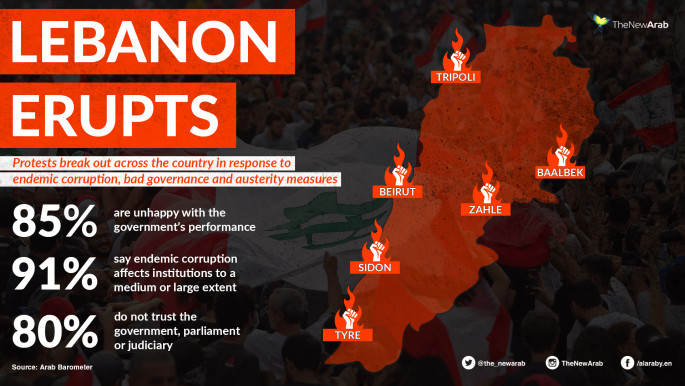Pro-government violence flares in Lebanon as mourning protesters demand release of activist
Protesters simultaneously mobilised to demand the release of fellow activist Khaldoun Jaber, who was reportedly seized following a demonstration on Wednesday, beaten up and taken to the army intelligence headquarters for interrogation.
Protesters continued to rally despite the increasing threat of violence from alleged pro-government enforcers, who many claim to be thugs from the Aounist Free Patriotic Movement (FPM), after a plain-clothed man was pictured firing at a demonstration in Beirut on Wednesday.
Eye witnesses reported that the armed forces, who were monitoring the protest, did nothing to stop the man, caught on video opening fire on demonstrators with a rifle. They claim it was only when demonstrators seized his weapon and threw stones at the assailant that they intervened.
Comment: The new patriotism in Lebanon and Iraq
FPM and Hezbollah supporters are known to have previously attacked anti-government demonstrators en masse, beating peaceful protesters and destroying their sit-in camps.
Fear and anger grows over ‘abducted’ activist
Meanwhile fears have been growing for activist Khaldoun Jaber, who had been leading the chants at Wednesday’s protest outside the presidential palace in Baabda.
Witnesses have said he was kidnapped and beaten up by army intelligence officers in plain clothes.
Twitter Post
|
He is thought to have been taken to the military intelligence headquarters in the nearby town of Rihaniye.
Protesters have staged a roadblock in Baabda, calling for his release. According to activists at the scene, the army has said it will release more information about Jaber if protesters end the roadblock on the Baabda highway, implicitly acknowledging they have detained him.
Twitter Post
|
Beirut mourns ‘first martyr’ Alaa Abou Fakher
In the capital, mass funeral marches took place on Wednesday evening for Alaa Abou Fakher, a prominent activist who was shot dead on Tuesday by army forces while at a demonstration.
Abou Fakher was a member of the Progressive Socialist Party (PSP) and a local councillor in Choueifat.
Twitter Post
|
Witnesses said the procession through the capital had a celebratory feeling, with attendees setting off fireworks and repeating the chants of the uprising, such as "Revolution, freedom, martyrdom," and "we swear to you, martyr, from your goal we will not veer."
Footage emerged on social media of Abou Fakher’s son being carried and cheered by the crowds.
A mural of Abou Fakher has already been created in his memory in Tripoli, northern Lebanon.
Aoun’s speech sparks fury
Earlier in the day, hundreds had protested close the palace of President Michel Aoun in Baabda, while the 84-year-old leader gave an angry televised interview, lashing out at protesters and saying there had been no significant steps towards forming a new cabinet after former prime minister Saad Hariri resigned in response to the protests last month.
Aoun told protesters they did not belong in the country if they don't like the current political system, mocking their demands for independent politicians by saying he would only be able to find them “on the moon”, due to the country’s highly divided sectarian political system.
Aoun also criticised the street movement's "lack of leadership", after previously saying he would be prepared to meet representatives to hear their demands.
The president was duly subject of widespread mockery on social media for his comments.
Sparked on 17 October by a proposed tax on free calls made through messaging apps such as WhatsApp, the protests have morphed into a cross-sectarian street mobilisation against an entire political class that has remained largely unchanged since the end of the country's 1975-1990 civil war.
Read more: Why Gebran Bassil is the most reviled politician in Lebanon today
What started as a spontaneous, apolitical and leaderless popular movement is becoming increasingly organised, with activists taking part in synchronise marches and stunts across the country.
After blocking off roads for days, protesters have switched targeted government bodies most associated with mismanagement and corruption.
 |
|
| Click to enlarge |
Follow us on Twitter and Instagram to stay connected
This article was updated to include a correction. An earlier version said Alaa Abou Fakher was killed by the army. He was killed by an off-duty soldier. The New Arab regrets this error.





 Follow the Middle East's top stories in English at The New Arab on Google News
Follow the Middle East's top stories in English at The New Arab on Google News
![The UAE is widely suspected of arming the RSF militia [Getty]](/sites/default/files/styles/image_330x185/public/2024-11/GettyImages-472529908.jpg?h=69f2b9d0&itok=Yauw3YTG)
![Netanyahu furiously denounced the ICC [Getty]](/sites/default/files/styles/image_330x185/public/2024-11/GettyImages-2169352575.jpg?h=199d8c1f&itok=-vRiruf5)
![Both Hamas and the Palestinian Authority welcomed the ICC arrest warrants [Getty]](/sites/default/files/styles/image_330x185/public/2024-11/GettyImages-2178351173.jpg?h=199d8c1f&itok=TV858iVg)